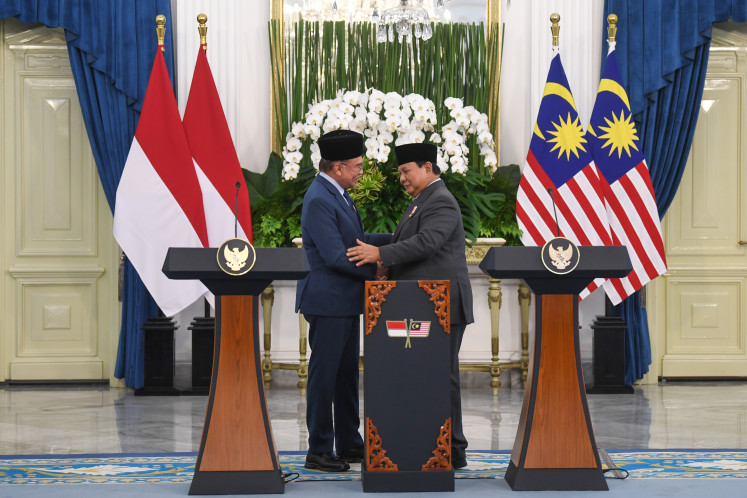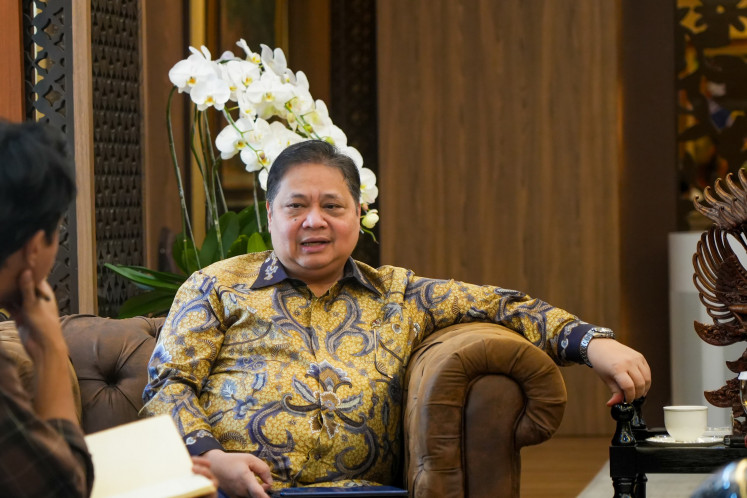Popular Reads
Top Results
Can't find what you're looking for?
View all search resultsPopular Reads
Top Results
Can't find what you're looking for?
View all search resultsInsight: Cabinet shake-up and withering presidential prerogative
Reshuffle within sight: In a recent file photo, President Susilo Bambang Yudhoyono (left) and Vice President Boediono hold a press conference after the Surakarta church bombing
Change text size
Gift Premium Articles
to Anyone
R
span class="caption" style="width: 378px;">Reshuffle within sight: In a recent file photo, President Susilo Bambang Yudhoyono (left) and Vice President Boediono hold a press conference after the Surakarta church bombing. Yudhoyono has promised to reshuffle his Cabinet by Oct. 20. (Antara/Widodo S. Jusuf) At least until Oct. 20, when President Susilo Bambang Yudhoyono is expected to announce his new Cabinet composition, the public, including politicians and scholars, will continue to debate presidential prerogatives regarding new Cabinet members.
Given a more normal situation, there is nothing wrong with such a controversy. Under a presidential system of government, the President has the sole right to form the Cabinet and therefore choose his or her ministers. There is no one else that can force or dictate the appointment of certain individuals appointed to serve in an administration.
Unfortunately, over the last 13 years following the fall of Soeharto in May 1998, Indonesia has not been in a normal situation. If “not normal” sounds demeaning, one can always borrow or refer to T.J. Pimpel’s term: “uncommon”.
Our democratic transition, as it has been crafted, can be characterized as uncommon because of existing paradoxes, such as a presidential system of government with a large number of coalition members and regional autonomy in a unitary state that has confused relations between the central and regional governments.
No less uncommon are democratically elected institutions such as the Regional Representative Council (DPD), which enjoys significant political and legislative power. There are more examples.
Theoretically, if one were to craft or design democracy in a presidential system of government, it is only logical that he or she would write a law that limits the number of political parties.
The basis for this argument is that a dominant party would likely emerge in a, lets say, two party system. This would ensure a healthy and clear check and balance mechanism and would likely make it easier for the President to exercise his prerogative.
The transition to democracy was initiated in 1998 as a reaction to the authoritarian policies under the Soeharto regime, when almost all of us opted for the politics of relaxation and liberalization in the truest sense. There was no single party politician, member of the House or political observer willing to consider the idea of a limited number of political parties.
Under the guise of democracy and civil liberties, we were willing to witness the birth of a large number of political parties. In the early years of the transition, 200 parties were registered with the Law and Human Rights Ministry.
Forty-eight political parties contested the elections in 1999, but only 20 gained one or more seats in the House.
The result of the 2004 elections, when Indonesia held its first direct presidential election, was similar. Though the number of parties represented in the House had decreased substantially, there were still 16 political parties in the legislature. This number decreased even further in the 2009 elections, when only nine political parties passed the 2.5 percent legislative threshold.
From 1999 through 2009, none of those parties enjoyed a dominant position to secure a simple majority standing. In fact, only three parties gained a respectable vote of beyond 10 percent.
Such realities hampered the capacities of presidents Abdurrahman Wahid, Megawati Soekarnoputeri and Yudhoyono in fully exercising their prerogatives. All leaders, to differing degrees of intensity, were forced to accommodate other interests and share their executive power with other existing power brokers, however small their party representation might have been. Neglect of such interests could lead to challenging opposition within the House and potentially immobilize the presidential agenda and lead to political gridlock.
Unlike his predecessors, and this only strengthens the view that presidential prerogative is actually no longer in existence, President Yudhoyono’s second term (2009-2014) has institutionalized this iron law of a mixture between a multi-party system and a presidential type of government in the form of a Coalition Joint Secretariat headed by the President himself.
If this politics of coalition were to be implemented responsibly, any key decision making process requires the involvement of coalition members. It is in the light of such a political arrangement that presidential prerogative has been substantially reduced, shackled by the President’s perceived need to solicit support from the fragmented political forces in the legislature.
What has been happening over the last couple of weeks, the meaningless talks of a Cabinet shake-up, are the consequence of the road we are taking in designing our democracy. Those who would be implicated by the Cabinet reshuffle would only say that, as such, it was indeed the President’s prerogative. Yet, at the same time, they could not afford not to maneuver for influence to shape the decisions the President would eventually make.
Being the largest coalition partner, the Golkar Party has made clear their hopes for additional seats in the Cabinet. In the meantime, the Prosperous Justice Party (PKS) has already embarked on a pre-emptive move to prevent any negative impacts of a Cabinet reshuffle. Should it happen, they promise to reveal the contents of the pact between Yudhoyono and PKS leader Hilmi Aminuddin.
All are reminding Yudhoyono, both as President and the head of the Joint Coalition, that any important decision he is going to make require thorough consultation with coalition members. In other words, he can no longer full enjoy his prerogative.
Should this be the case, let us hold our breath and control our long lost hopes that the Cabinet shake-up in the end is really intended to make things better. Otherwise, time and again we will plunge ourselves into the abyss of despair and disappointment.










